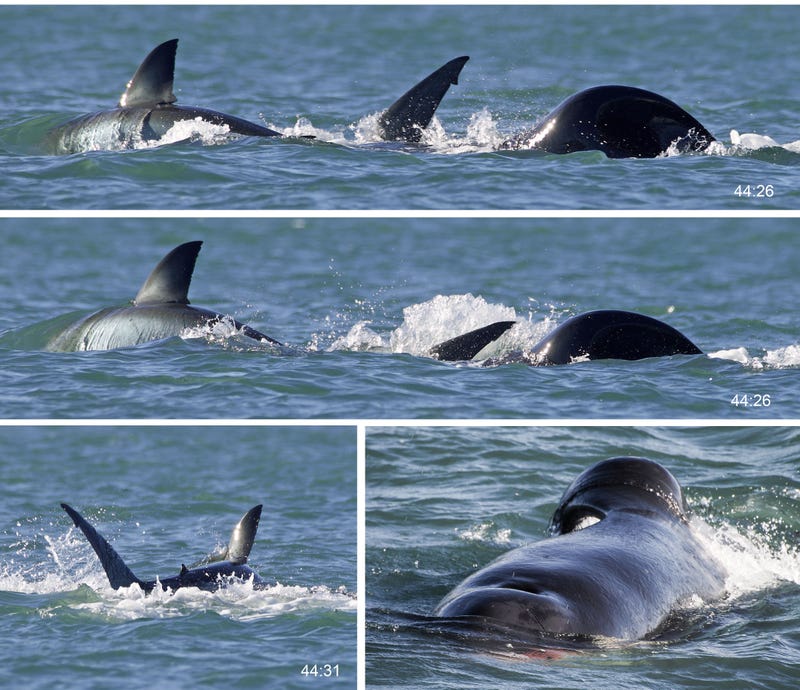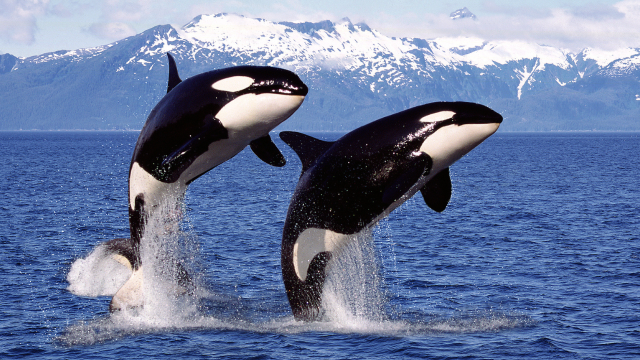Researchers studying orcas off the coast of South Africa recently observed one of the whales consuming a great white shark alone, in just two minutes.
Since 2017, two orcas in particular have been wreaking havoc on the great whites off South Africa’s Mossel Bay. Dubbed Port and Starboard (cute!), the apex predators have developed a taste for the massive sharks’ nutrient-rich livers (less cute). Haunting video of the whales actively feeding on a great white was captured in October 2022, confirming that the cetaceans were responsible for the great white carcasses found half-eaten on the South African shores.
Orcas’ predilection for great white sharks is well-documented; the whales can weigh up to 22,000 pounds (9,980 kilograms) and are great at ganging up on the sharks, which only (in comparison) weigh up to 5,000 pounds. But never before have searchers found a single orca dining on great white; previously, the animals have only been observed hunting and feeding in groups, or pods. The team’s analysis of the recent meal was published in the African Journal of Marine Science.
“Again, as previously in South Africa, the orcas are exhibiting a strong preference for extracting and consuming the lipid-rich livers of white sharks—a specialized feeding behavior,” said Alison Towner, a marine biologist at Rhodes University and lead author of the new research, in a Taylor & Francis release, “This sighting revealed evidence of solitary hunting by at least one killer whale, challenging conventional cooperative hunting behaviors known in the region.”

The solitary hunter (and diner) was Starboard, a male orca with a collapsed dorsal fin. The researchers watched Starboard incapacitate and eat a juvenile great white shark in two minutes. The unfortunate shark was 8.2 feet long (2.5 meters); the team also watched as Starboard carried the shark’s liver in its mouth.
“Over two decades of annual visits to South Africa, I’ve observed the profound impact these killer whales have on the local white shark population,” said study co-author Primo Micarelli, a researcher at the Shark Studies Centre and Siena University, in the same release. “Seeing Starboard carry a white shark’s liver past our vessel is unforgettable.”
“Despite my awe for these predators, I’m increasingly concerned about the coastal marine ecology balance,” Micarelli added. Tagging and sighting data previously taken on the habitat suggested great white sharks stopped visiting certain areas along the coast due to the presence of orcas. In other words, the orca’s hunger seemed to be impacting the food chain in the ecosystem.
Late last year, a liver-less great white washed up on the Australian coast, indicating that orcas beyond the group operating off South Africa had learned how to prey on the fearsome fish. Orcas also feed on blue whales (the largest animal ever known), may kidnap other species of whale, and were responsible for a spate of attacks on human vessels last year—even managing to sink a yacht off the coast of Gibraltar.
Orcas are cunning predators with an evident nasty streak. While they probably won’t evolve to hunt on land anytime soon, their presence could disrupt the hierarchy of the South African coastal ecosystem.
